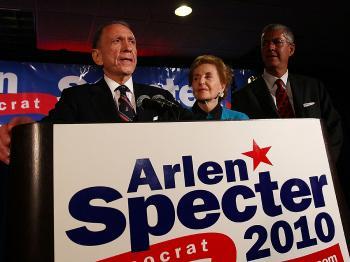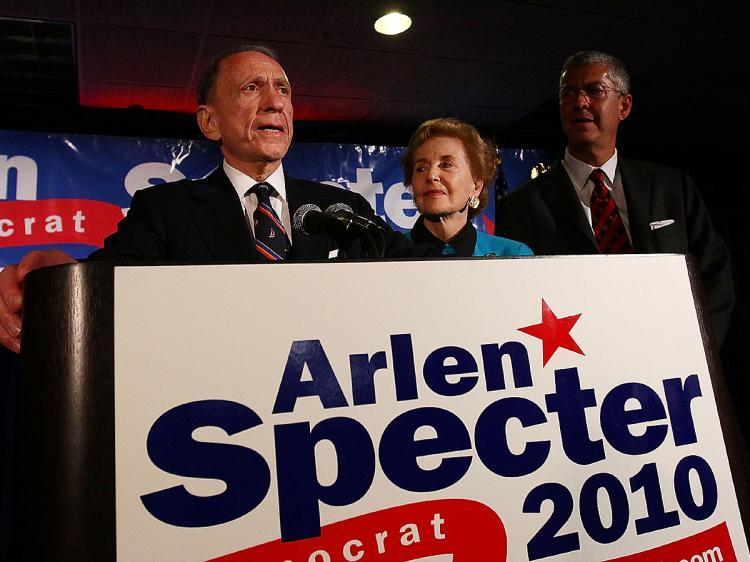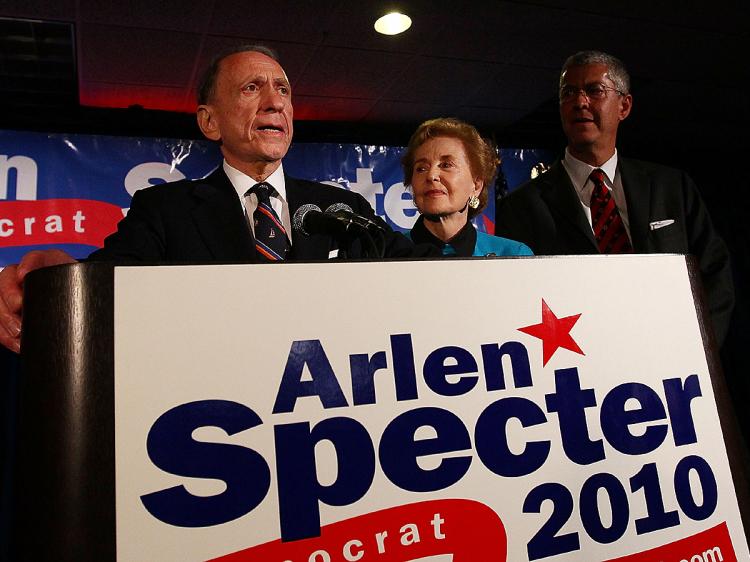As polls in Arkansas, Kentucky, Oregon, and Pennsylvania closed on Tuesday evening, political pundits and party candidates will examine the results and gauge the effects of anti-incumbent sentiment on upcoming summer primaries—and this fall’s midterm elections.
Tuesday’s primaries in states like Arkansas, Pennsylvania, and Kentucky, as well as this month’s earlier precedents set in states like West Virginia, lend credence to the assertion of growing discourse and voter frustration with Washington politics, and no party is immune.
Democrats are facing a string of announced congressional retirements—most recently senior member of the House David R. Obey of Wisconsin—and along with Republicans are feeling the heat from a rise in anti-incumbent sentiment and conservatism within their respective parties; both also are feeling the pressure of limited-government, tea party activist messages.
West Virginia’s Democratic primary last week seemed to confirm these re-election fears when U.S. House 14-term incumbent Rep. Alan Mollohan of West Virginia lost to state Sen. Michael Oliverio, who carried 56 percent of the vote to Mollohan’s 44 percent.
Oliviero criticized Mollohan and Congress’s increased federal spending and recent health care reform and ran on a fiscally conservative message. “We announced our campaign 100 days ago, and in 100 days’ time our country has fallen one-third of a trillion dollars further into debt,” Oliverio said, according to an AP report. “We have to get the country’s financial house in order, and that’s what we’re committed to doing.”
This message is resonating across party lines, but Republicans are opportunistic in pointing out that the overall theme is a rejection of Obama and the Democratic-led legislature’s policies.
“People just didn’t like what was happening in Washington,” Oliviero’s Republican opponent former state GOP chairman David McKinley stated, commenting on Mollohan’s defeat. “It’s clear this is not the agenda they wanted. This wasn’t the change they envisioned.”
Republican pundits, running further with this platform of rejecting Democratic big-government expansionism, are predicting defeats for Democrats in November, but are themselves not safe from anti-incumbent fever, or tea party backlash.
Utah’s Republican primary takes place in June, but recently sitting U.S. Sen. Bob Bennett was ousted from a bid for his seat at Utah’s GOP Convention earlier this month.
The three-term incumbent, criticized by tea party activists for aligning with Democrats in supporting the Troubled Assets Relief Program (TARP), was turned down by the party’s state leadership in a third round vote May 8, receiving 27 percent of the delegates’ vote.
This leaves Republican candidates businessman Tim Bridgewater and attorney Mike Lee to face off in the June 22 primary.
Florida Gov. Charlie Crist, locked into a tough Republican primary with fellow candidate Marco Rubio for a Florida U.S. Senate seat, recently announced he was leaving the Republican Party, and hence declared himself an Independent candidate for the U.S. Senate.
Crist may have been feeling heat from conservatives critical of his support for certain Obama initiatives—like the economic stimulus package—and pressure from the atmosphere introduced by this season’s anti-incumbent sentiment.
The announcement saw a boost in poll numbers for Crist that initially put him ahead of Rubio; a boost that has subsided, as of late.
Rasmussen Reports survey-of-likely-voters numbers released Monday have Republican candidate Marco Rubio ahead with 39 percent of the vote, followed by independent Crist with 31 percent and Democratic candidate Kendrick Meek trailing at 18 percent.
Florida’s congressional primary takes place Aug. 24.
Primaries heat up when summer begins. Alabama, California, Iowa, Maine, Mississippi, Montana, Nevada, North and South Dakota, New Jersey, New Mexico, and South Carolina all have congressional primaries in June.
Tuesday’s primaries in states like Arkansas, Pennsylvania, and Kentucky, as well as this month’s earlier precedents set in states like West Virginia, lend credence to the assertion of growing discourse and voter frustration with Washington politics, and no party is immune.
Democrats are facing a string of announced congressional retirements—most recently senior member of the House David R. Obey of Wisconsin—and along with Republicans are feeling the heat from a rise in anti-incumbent sentiment and conservatism within their respective parties; both also are feeling the pressure of limited-government, tea party activist messages.
West Virginia’s Democratic primary last week seemed to confirm these re-election fears when U.S. House 14-term incumbent Rep. Alan Mollohan of West Virginia lost to state Sen. Michael Oliverio, who carried 56 percent of the vote to Mollohan’s 44 percent.
Oliviero criticized Mollohan and Congress’s increased federal spending and recent health care reform and ran on a fiscally conservative message. “We announced our campaign 100 days ago, and in 100 days’ time our country has fallen one-third of a trillion dollars further into debt,” Oliverio said, according to an AP report. “We have to get the country’s financial house in order, and that’s what we’re committed to doing.”
This message is resonating across party lines, but Republicans are opportunistic in pointing out that the overall theme is a rejection of Obama and the Democratic-led legislature’s policies.
“People just didn’t like what was happening in Washington,” Oliviero’s Republican opponent former state GOP chairman David McKinley stated, commenting on Mollohan’s defeat. “It’s clear this is not the agenda they wanted. This wasn’t the change they envisioned.”
Republican pundits, running further with this platform of rejecting Democratic big-government expansionism, are predicting defeats for Democrats in November, but are themselves not safe from anti-incumbent fever, or tea party backlash.
Utah’s Republican primary takes place in June, but recently sitting U.S. Sen. Bob Bennett was ousted from a bid for his seat at Utah’s GOP Convention earlier this month.
The three-term incumbent, criticized by tea party activists for aligning with Democrats in supporting the Troubled Assets Relief Program (TARP), was turned down by the party’s state leadership in a third round vote May 8, receiving 27 percent of the delegates’ vote.
This leaves Republican candidates businessman Tim Bridgewater and attorney Mike Lee to face off in the June 22 primary.
Independence
Florida Gov. Charlie Crist, locked into a tough Republican primary with fellow candidate Marco Rubio for a Florida U.S. Senate seat, recently announced he was leaving the Republican Party, and hence declared himself an Independent candidate for the U.S. Senate.
Crist may have been feeling heat from conservatives critical of his support for certain Obama initiatives—like the economic stimulus package—and pressure from the atmosphere introduced by this season’s anti-incumbent sentiment.
The announcement saw a boost in poll numbers for Crist that initially put him ahead of Rubio; a boost that has subsided, as of late.
Rasmussen Reports survey-of-likely-voters numbers released Monday have Republican candidate Marco Rubio ahead with 39 percent of the vote, followed by independent Crist with 31 percent and Democratic candidate Kendrick Meek trailing at 18 percent.
Florida’s congressional primary takes place Aug. 24.
Primaries heat up when summer begins. Alabama, California, Iowa, Maine, Mississippi, Montana, Nevada, North and South Dakota, New Jersey, New Mexico, and South Carolina all have congressional primaries in June.






